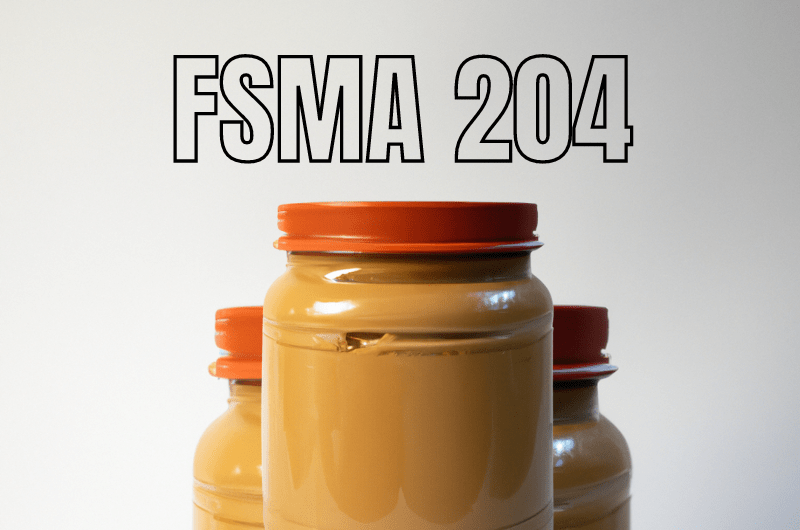The FSMA 204 deadline is closing in and with it comes a new, stricter set of recordkeeping requirements for companies that manufacture, process, pack, or hold nut among other products on FDA’s Food Traceability List (FTL). One chocolate butters company saw this as an opportunity to get compliant fast. And, they did it for peanuts. Or…the lowest cost possible. Here’s how.
Traceability for the love of chocolate
Every chocolate on supermarket shelves exists because of an intricate global food supply chain consisting of farmers and exporters, roasters and processors, distributors and retailers who transform and transport the product from bean to bite. While chocolate itself isn’t included on the FTL, a common ingredient added to chocolate bars and candies is: nut butters. One chocolate company saw this as an opportunity to get compliant – fast.
The request for FSMA 204 food traceability compliance came to the chocolate company from one of its key customers: a large, Midwest retailer that was one of the first to adopt the ReposiTrak Traceability Network®. The retailer requested that all suppliers who sold FTL foods to join RTN to exchange traceability information. Because nut butters are on the FTL, suppliers of nut butter products and those using nut butters as ingredients are required to share specific Key Data Elements (KDEs) with the retailer.
The chocolate company, having built its brand on sustainability and social responsibility, became one of the first to successfully begin exchanging the required FSMA 204 food traceability data with the retailer. Now that they’re onboard with RTN, traceability data can be exchanged along with the product, without the use of additional labeling and scanning steps or the need for new hardware or software that would only increase costs.
How is FSMA 204 transforming the nut butter industry?
The FDA’s FSMA 204 law changes the way suppliers and their retail, wholesale, processor and restaurant exchange food traceability data. Listed on the FTL, the nut butters category comprises “all types of tree nut and peanut butters” and includes “shelf stable, refrigerated, and frozen products.”
The rule applies to nut butters sold as a consumer product, as well as to those used as ingredients in any product that hasn’t gone through a kill step. Examples provided by the FDA include, but are not limited to, almond, cashew, chestnut, coconut, hazelnut, peanut, pistachio, and walnut butters. Soy or seed butters are not included.
If you sell nut butters If your organization is involved with nut butter, it’s now your legal obligation to comply. What does FSMA 204 mean for companies that deal with nut butters? Here’s what you need to know now.
1. Creating a Traceability Plan
One of the new requirements under FSMA 204 is the requirement that impacted companies create and maintain a traceability plan.
Your food traceability plan should include:
- An outline of the procedures you use to maintain your traceability records, including the format and location of these records
- An outline of the procedures you use to identify foods on the FTL that you manufacture, process, pack, or hold
- An outline of how you assign traceability lot codes to foods on the FTL
- A point of contact for questions regarding your traceability plan and records
In addition, if you grow or raise a food on the Food Traceability List (other than eggs), your traceability plan should also include a farm map showing the areas in which you grow or raise such food.
2. Assigning Traceability Lot Codes
Under FSMA 204, organizations in the nut butter industry must also assign a traceability lot code (TLC) to a food on the FTL if they:
- Initially pack a raw agricultural commodity (RAC) other than a food obtained from a fishing vessel
- Perform the first land-based receiving of a food obtained from a fishing vessel
- Transform a food
If an organization receives a food on the FTL from a supplier that is not subject to FSM 204, they must assign a TLC if one has not already been assigned (unless you are a retail food establishment or restaurant).
A new TLC should not be assigned when other activities involving the food are performed, such as shipping.
3. Improved Record Keeping
FSMA 204 also identifies Critical Tracking Events (CTEs) for which records containing Key Data Elements (KDEs) must be kept. The KDEs required will vary depending on the CTE.
The CTEs outlined in FSMA 204 are:
- Harvesting
- Cooling
- Initial packing
- First land-based receiving
- Shipping
- Receiving
- Transformation
For a detailed description of the required KDEs for each CTE, see Critical Tracking Events and Key Data Elements.
In addition to creating and maintaining these more detailed records, organizations must also provide information to the FDA if requested within 24 hours, or within a reasonable time agreed by the FDA.
Get Started on Your Food Traceability Journey Now
For companies in the nut butter industry, FSMA 204 will mean significant to your operations. And, while that sounds like you’ve got a long time to prepare, the considerable work that needs to be done to become compliant. There’s no time like the present to get started.
The ReposiTrak Traceability Network is backed by the industry as the lowest-cost, easiest-to-adopt FSMA 204 food traceability solution. It solves supply chain collaboration challenges that involve tracking products from manufacturer and grower, through warehouses and distribution centers, all the way to the retail store – without the need for new labels or scanning, or new hardware or software.
Ready to get started on your food traceability journey? Contact ReposiTrak TODAY!

